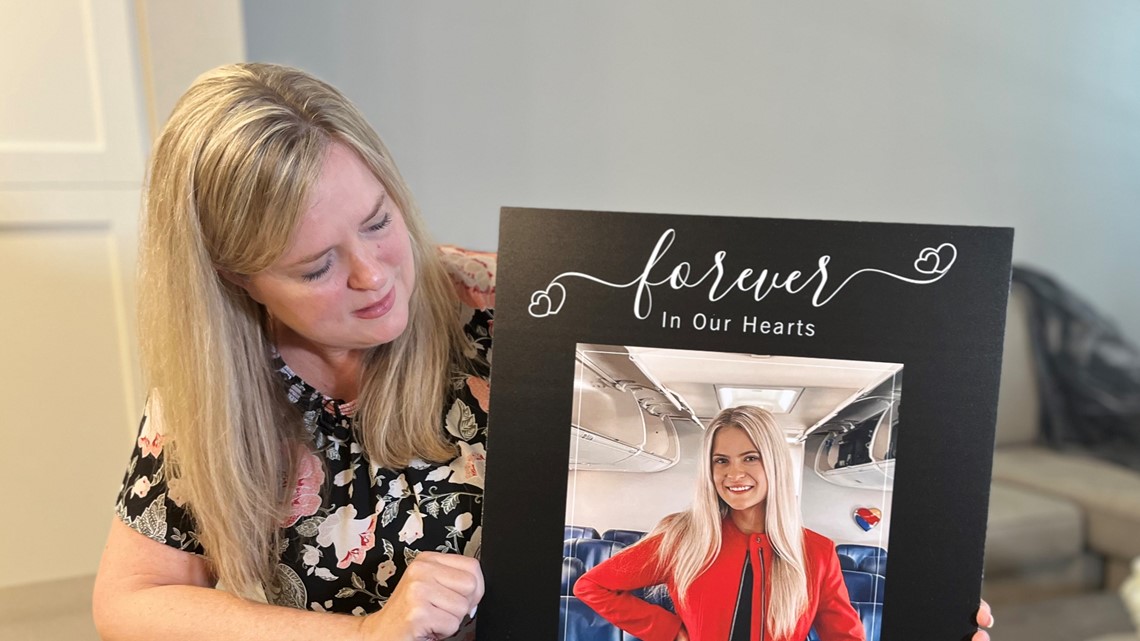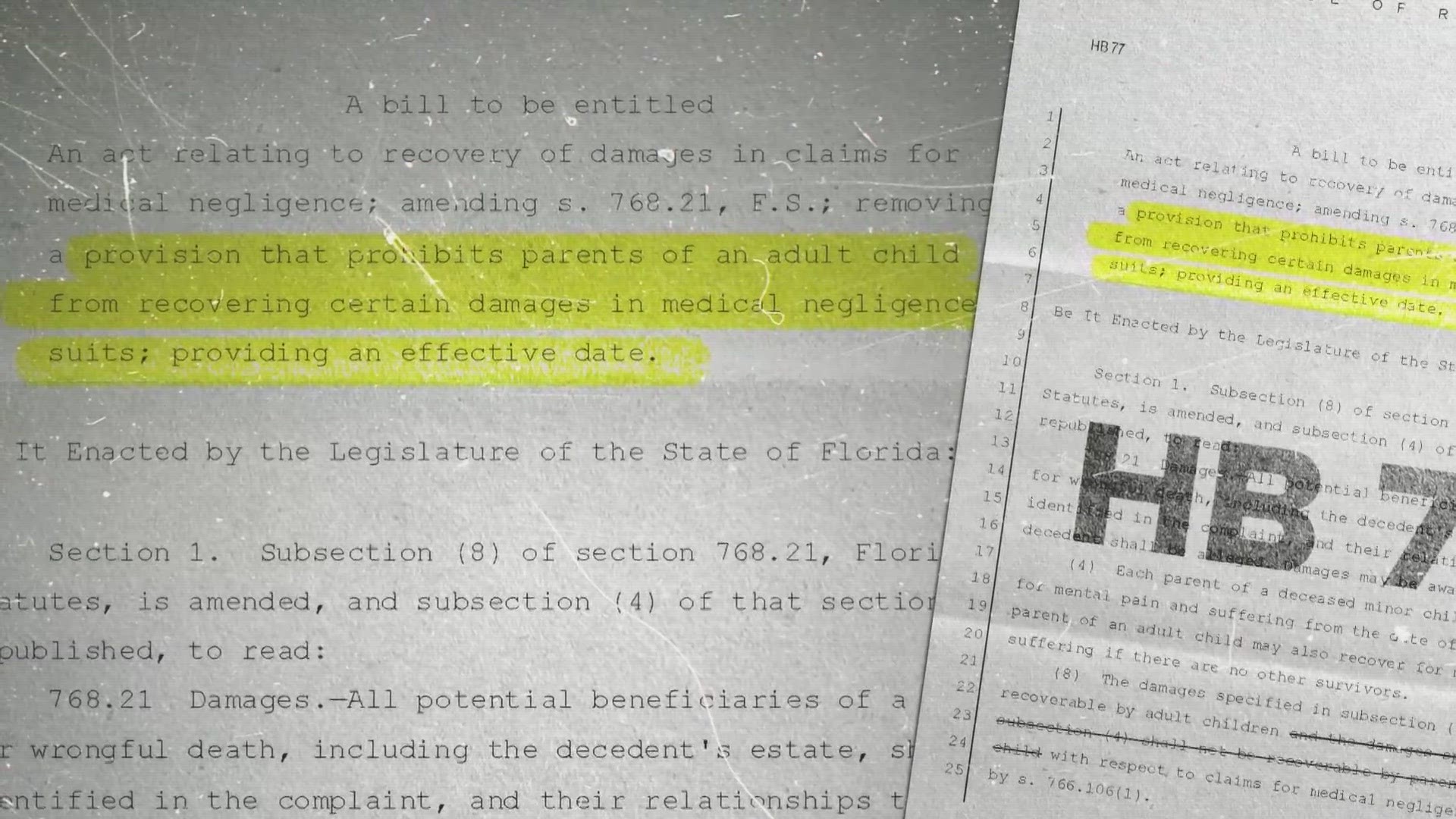JACKSONVILLE, Fla. — Cindy Jenkins, who lives in St. Johns County, found out about Florida’s “Free Kill” law after her daughter died this past March in a hospital near Orlando.
“Knowing that my child, before I could even make it to Orlando from Jacksonville, was being failed by the very people who took an oath to do no harm. And then I'm on a mission to hold them accountable through the justice system, and I find out, you don't have access,” Jenkins said.
Her daughter, Taylor, had just turned 25 months before she was in a car accident and rushed to the hospital. She says doctors failed to recognize a torn artery that led to internal bleeding until it was too late.


“She grew up to be my best friend, so I not only lost a child that day. I lost one of my best friends,” Jenkins said.
She believes Taylor was the victim of medical malpractice. She turned to numerous attorneys for help and kept hearing the same questions.
“I was asked three questions, ‘How old was Taylor?’ And I said, ‘She just turned 25.’ And they said, ‘Okay, well, was she married?’ I said, ‘No, she wasn't married yet.’ And they said, ‘Okay, did she have kids?’ And I said, ‘No. And then I was informed that they couldn't help me because of this “Free Kill” law,” Jenkins said.
A Florida law that has been on the books since 1990 prevents families from suing for medical malpractice if their loved on who died was over the age of 25, had no children under 25 and was not married. Critics call it the “Free Kill” law because had the person survived, they could have filed a lawsuit, but if they died no one can sue on their behalf.
State Senator Clay Yarborough, a Republican, wants to see the law changed. He recently filed Senate Bill 248 which has bi-partisan support.
“At the end of the day, the reason I'm pushing this is because it shouldn't matter if someone is 25, or 24, or 26, and it shouldn't matter if they were married, or have children,” Yarborough said. “What's the value we put on life? One individual's life shouldn't be held in higher regard than another individual.”
Yarborough says his bill offers an alternative for those currently shut out of court.
“Today you don't have any access to the courts. And previously, when we've taken up these kinds of bills, they've passed the House but not the Senate or there's been interest on one side but not the other,” Yarborough said. “So, this may not be completely where some out there may want it to be, but it's still opening up a path that doesn't exist today under current law.”
His bill would require those families, who under current law can’t file a lawsuit, to first file a complaint with the Department of Health of Agency for Health Care Administration. If probable cause was found, then they could sue.
“You file a complaint,” Yarborough explained. “Then you have a determination that's made by the panel and the Department of Health, the probable cause panel, and they say this looks like it was medical negligence, then you have standing that you can then go to the court, and you can file a suit in civil court to be able to sue for damages for medical negligence.”
But Jenkins says the battle just to get her daughter's medical records has been a daunting task, and this extra step she believes is an unnecessary hurdle.
“What this bill really does is plunk Mount Everest in front of family members that have just lost their loved ones. And if you can climb Mount Everest and make it to the other side, and AHCA or DOH find probable cause, then you can have the same right as everyone else to our judicial system,” Jenkins said. “Medical malpractice either occurred or it did not. It truly is that simple. A letter from a certified physician stating that the standard of care was not met and that medical malpractice, in fact, occurred should suffice for accessing the judicial system and filing a claim. Requiring anything else simply places roadblocks between grieving human beings and their right to the judicial system. “
Two other bills have been filed in the Florida House to change the law. House Bill 129, known as the Keith Davis Family Protection Act. would outright appeal the law. It was filed by Democrat Representative Johanna Lopez and Republican Representative Mike Beltran.
“We know that the majority of our doctors are very responsible. This is not against the medical field. You know, we know that accidents might happen, but what we also want to hold accountable the ones that are not doing the right thing,” Lopez said. "I think that this is a very bipartisan issue that needs to be addressed because this is just the voice of the Floridians."
House Bill 77 would remove the provision that prohibits parents of adult children from recovering certain damages in medical negligence suits. Republican Representative Spencer Roach, who sponsored HB 77, declined our request for comment.
“The entire law needs to go,” Jenkins said. “The entire thing needs to be repealed. That's what I want to see happen.”
Prior efforts to repeal the law have been opposed by the Florida Chamber of Commerce. Andy Bolin represents, who represents health care providers, opposes efforts to peel back the law.
“The litigation doesn't just strain the physician in that particular case. It strains the entire system. And when we have a state where more and more people are accessing our system every single year, we don't need to remove protections,” Bolin said. “I think we need to keep as many of them in place as we can.”
Yarborough says he welcomes input from everyone and is open to changing it to make it better.
“I think the bill that I filed in the Senate is a balanced product that we can offer as a starting point. And I stress that it's a starting point because I want to hear the input. I want to hear how folks feel about it, who were impacted. I want to hear how my colleagues feel about it,” Yarborough said. “I would say across the state that those who are very passionate about a change in this law should go and make sure their representatives and their senators hear from them. And then if they're not able to make those delegation meetings, where they are in person, call their offices, send them an email, get in touch, let them know how they feel about it. That's very important.”
Jenkins is fighting to change the law knowing that repealing it won't change her situation but hoping to prevent other families from enduring her pain.
“I never want another family member to experience this,” Jenkins said. “And I can't say enough. If the tables were turned, and I had been the free kill, my girls would not be able to handle this.”

